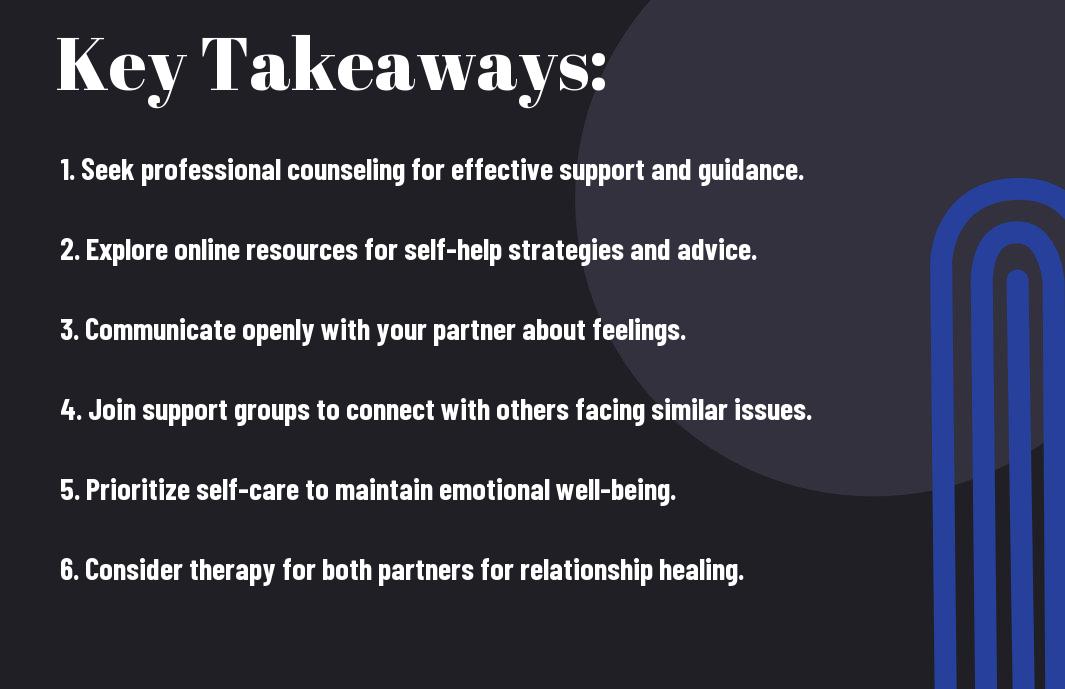It’s a devastating experience when you discover infidelity in your relationship, leaving you feeling lost and heartbroken. This blog post will guide you through the effective resources and counseling services available to help you navigate these turbulent emotions. You’ll learn about supportive programs and therapists who specialize in healing from betrayal, providing you the tools to process your feelings and rebuild your life. You deserve to prioritize your well-being while you heal and regain your strength.
Key Takeaways:
- Infidelity can lead to a wide range of emotional responses, highlighting the need for professional support.
- Counseling services can provide a safe environment for partners to explore their feelings and communicate effectively.
- Books and online resources can offer valuable insights and coping techniques for those affected by infidelity.
- Support groups may play a significant role in helping individuals share experiences and gain perspective from others facing similar issues.
- Setting boundaries and focusing on self-care are necessary steps in the healing process post-infidelity.
- It is important to assess whether the relationship has the potential for recovery before deciding to continue or part ways.
- Professional therapists may offer tailored strategies for rebuilding trust and intimacy after infidelity.


Understanding Infidelity
To navigate the complexities of infidelity, it’s imperative to grasp its various dimensions. Infidelity can manifest in numerous forms, affecting the emotional fabric of relationships and individuals alike.
Definitions and Types of Infidelity
To clarify infidelity, recognize that it includes both emotional and physical betrayals. Here are key types:
- Emotional infidelity – connecting deeply with someone outside your relationship.
- Physical infidelity – engaging in sexual acts with another person.
- Cyber infidelity – online relationships or interactions that undermine trust.
- One-night stands – impulsive encounters that breach loyalty.
- Long-term affairs – ongoing relationships hidden from your partner.
Perceiving infidelity requires a nuanced understanding of these types to address the underlying issues effectively.
| Type of Infidelity | Description |
|---|---|
| Emotional Infidelity | Deeper connections with someone else. |
| Physical Infidelity | Engaging in sexual relations with others. |
| Cyber Infidelity | Online relationships or inappropriate messages. |
| One-night Stands | Short-lived encounters outside your relationship. |
| Long-term Affairs | Secret long-lasting relationships impacting stability. |
Psychological Impact on Individuals
Understanding the psychological consequences of infidelity is vital. It can lead to feelings of betrayal, decreased self-esteem, and overwhelming emotional distress. Individuals may experience intense emotions, including anger, grief, and confusion, which can interfere with daily functioning.
In fact, the fallout from infidelity not only affects the betrayed partner but can also shape the mindset of the unfaithful. You may feel shame or guilt, complicating the healing process. It’s imperative to seek support during this time, as the repercussions—such as mental health struggles or relationship breakdowns—can be profound. By addressing these feelings, you can foster understanding and pave the way for recovery.

Common Reactions to Infidelity
While infidelity can lead to a tumultuous mix of emotions and behaviors, understanding these common reactions can help you navigate the aftermath. You may experience shock, anger, or profound sadness as you grapple with the betrayal. Recognizing that these emotional responses are normal may provide some comfort as you work through your feelings and decide on your next steps.
Emotional Responses
Against this backdrop of betrayal, you might find yourself experiencing a whirlwind of emotions ranging from disbelief to intense anxiety. It’s crucial to acknowledge these feelings, as they are natural reactions to a situation that deeply challenges your trust and sense of security. Taking time to process your emotions can help you move towards healing.
Behavioral Changes
One of the most notable effects of infidelity is a shift in your behavior. You may feel compelled to isolate yourself or, conversely, seek out company as a way to cope with the emotional turmoil. It’s normal to experience changes in your daily habits, from sleep patterns to work productivity, as the distress of betrayal seeps into various aspects of life.
Changes in behavior like withdrawing from loved ones or becoming overly dependent on distractions can signal your struggle to cope. Alternatively, you may find yourself engaging in uncharacteristic behavior as a form of escapism or retaliation. It’s important to be mindful of these shifts—positive coping mechanisms, such as open communication and seeking professional help, can greatly enhance your recovery, while destructive behaviors may lead to further emotional turmoil. Recognizing these changes enables you to take appropriate steps toward healing.
Coping Strategies for Individuals
Now that you’ve faced the reality of infidelity, it’s vital to develop coping strategies that promote healing and emotional well-being. Acknowledging your feelings and taking proactive steps can help you regain control and foster resilience during this challenging time. By prioritizing self-care and reaching out to your support network, you can navigate the aftermath of infidelity with greater clarity and composure.
Self-Care Practices
Practices that foster self-care are vital as you navigate the emotional turmoil of infidelity. Engage in activities that nurture your body and mind, such as regular exercise, balanced nutrition, and adequate sleep. Additionally, consider mindfulness techniques such as meditation or journaling to process your feelings. Prioritizing your well-being will help you build a solid foundation for healing.
Seeking Support from Friends and Family
Among the most beneficial actions you can take is seeking support from friends and family. Surrounding yourself with loved ones who care about you can provide a safe space for expressing your emotions and fears. Connecting with others not only helps alleviate feelings of isolation but also offers new perspectives and insights on your situation.
From sharing your experiences to simply enjoying their company, friends and family can significantly uplift your spirits. Their understanding and encouragement can foster a sense of hope and remind you that you are not alone in this journey. However, it’s vital to choose those who provide positive reinforcement and empathy, as negative responses can exacerbate feelings of pain and betrayal. By nurturing these relationships, you create a strong support network that plays a vital role in your healing process.
Professional Counseling Services
Not all relationships can heal on their own, which is why seeking professional counseling is often important. Trained therapists can guide you through the complex emotions of infidelity, providing a safe space to express yourself while also developing effective coping strategies. By engaging in a therapeutic relationship, you can begin to understand the underlying causes of infidelity and work towards rebuilding trust and emotional intimacy.
Therapy Options for Individuals
Behind the pain of infidelity lies a myriad of feelings that can be overwhelming. Individual therapy provides a private setting where you can explore your emotions, articulate your needs, and start the healing process. A licensed therapist will help you identify personal patterns that may contribute to your circumstances, empowering you to make informed choices for your emotional well-being.
Couples Counseling Approaches
An effective way to address infidelity is through couples counseling, where both partners can explore their feelings and motivations openly. This type of therapy aims to foster understanding and develop communication skills that are important for rebuilding trust and connection. Working collaboratively with a therapist, you and your partner can navigate the challenges of infidelity together.
Another approach in couples counseling is the emotionally focused therapy (EFT), which concentrates on the emotional responses of both partners. This method helps identify negative patterns in your relationship, enabling you to reconnect on a deeper level. Through guided sessions, you will learn how to express your needs and feelings without blame, laying a foundation for trust. Additionally, incorporating cognitive-behavioral therapy (CBT) can assist you in challenging unhelpful thoughts surrounding infidelity, promoting healthier communication patterns. Each of these approaches can lead to a more robust and resilient relationship after navigating the challenges of infidelity.
Online Resources and Community Support
Keep seeking support by exploring various online resources designed to help you navigate the complexities of infidelity. One such helpful resource is Practical, Science-Based Steps to Heal from an Affair, which offers expert insights to guide you through this difficult time.
Websites and Online Platforms
For individuals dealing with infidelity, several credible websites and online platforms can provide guidance, articles, and tools for recovery. Many sites focus on coping strategies and personal growth, helping you find answers and support when you need it most.
Support Groups and Forums
Groups dedicated to sharing experiences and healing can be incredibly beneficial. You’ll find numerous online forums where fellow individuals who have faced similar challenges share their stories and insights. This community support can foster a sense of belonging and understanding, alleviating feelings of isolation. Engaging with others who understand your situation allows for open discussions and validation of your emotions. These can be crucial in your recovery journey.
Also, these support groups often provide a safe space for you to express your feelings without judgment. You can find both emotional support and practical advice from those who have walked a similar path. Furthermore, sharing your journey might be empowering, as it can help you gain perspective and realize you are not alone in this challenging experience.
Moving Forward After Infidelity
Once again, it’s vital to acknowledge that moving forward after infidelity is a complex journey that requires both partners to engage in honest communication and commitment to healing. You may experience a whirlwind of emotions, but embracing the process can lead to personal growth and a renewed partnership. Focusing on understanding each other’s feelings will help you navigate this challenging time together.
Rebuilding Trust
After infidelity, rebuilding trust is vital for the relationship’s survival. This process involves consistent transparency, open dialogue about feelings, and a genuine commitment to change. You will need to address the underlying issues that contributed to the betrayal, fostering an environment where you both can feel safe and secure moving forward.
Creating a Stronger Relationship
After infidelity, creating a stronger relationship is possible through intentional efforts from both partners. This includes establishing new boundaries, engaging in active listening, and rediscovering activities that foster connection. Prioritize one another’s needs and emotions, ensuring mutual respect and understanding as you rebuild your bond.
And as you work on creating a stronger relationship, it’s important to focus on shared goals that promote teamwork. Engaging in couples therapy can guide you in addressing past wounds while exploring new patterns of interaction. You may find that open dialogues and regular check-ins help in expressing feelings and enhancing vulnerability. By being intentional about your growth as a couple, you can ultimately emerge more resilient and connected than before.
FAQ
Q: What are the first steps to take after discovering infidelity?
A: Upon discovering infidelity, it’s important to take a moment to process your emotions. Initial feelings may include shock, anger, or betrayal. Try to avoid making impulsive decisions during this time. Consider seeking counseling or therapy to help you navigate your feelings and gain clarity on your next steps. Open communication with your partner is vital, as is establishing personal boundaries to protect your emotional well-being.
Q: How can counseling help me cope with infidelity?
A: Counseling can provide a safe space to explore and express emotions related to infidelity. A trained professional can help you make sense of your feelings, develop coping strategies, and assist either in navigating the relationship toward healing or in making informed decisions about moving forward separately. Couples therapy may also aid in understanding the underlying issues that led to infidelity, fostering better communication and intimacy.
Q: What types of resources are available for those dealing with infidelity?
A: Numerous resources are available to help individuals cope with infidelity. Books and online articles provide insights and personal experiences. Support groups offer shared experiences with others who have faced similar situations. Additionally, therapy apps can connect individuals with licensed professionals for convenience and privacy. Exploring community workshops or online seminars focused on relationship recovery can also be beneficial.
Q: Is it possible to rebuild trust after an affair?
A: Rebuilding trust is challenging but achievable with commitment from both partners. It requires open and honest communication, transparency in actions, and a willingness to understand the causes of the infidelity. Couples can work together to address emotional needs and relationship dynamics. Professional counseling can provide strategies and support during this process, fostering a renewed foundation for the relationship.
Q: When should I consider leaving the relationship after infidelity?
A: Deciding to leave a relationship after infidelity is a deeply personal choice and should be based on various factors. Consider the level of remorse and willingness to change from the unfaithful partner, the impact on your emotional and mental health, and the overall dynamics of the relationship. If attempts to rebuild trust and communication do not lead to improvement, or if the relationship becomes harmful, it may be time to seriously consider ending it. Consulting with a counselor can help clarify your decision.
